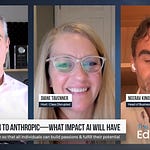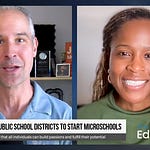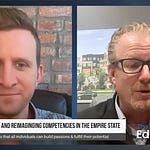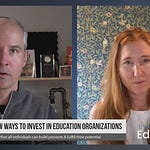Cyndi Court, CEO of Tiger Woods’ TGR Foundation, joined me to discuss the organization’s education work. It was an eye-opening conversation, as we talked about different components of career-connected learning and its benefits to students and employers. Cyndi shared stories of student’s journeys through their programs and the Foundation’s plans for the future. I loved her framework to organize career-connected learning as “learning about work, through work, and at work.” Have a listen or read the transcript and let me know your thoughts in the comments.
Michael Horn:
Welcome to the Future of Education, where we are dedicated to building a world in which all individuals can build their passions, fulfill their potential, and live a life of purpose. To help us think through how we accomplish that, I am tremendously excited for our guest today. She's the CEO of the TGR Foundation, none other than Cyndi Court. Cyndi, thank you so much for joining us today.
Cyndi Court:
Thanks for having us, Michael.
Cyndi’s Journey to the Work
Michael Horn:
You bet. So, before we get into the work of the foundation and some of the labs that you're running and scaling, just tell us about your own journey into the TGR Foundation and what attracted you to this opportunity specifically
Cyndi Court:
Yeah, I'm an educator. I did my education degree many years ago in Toronto, Canada, but I fell in love with the after-school space when my husband and I moved to Tampa, Florida. I love the creativity that happens in the after-school space. I love the fact that we can come alongside both schools and be great partners, supporting schools and local educators, but also come alongside families and provide wraparound services in the after-school space. I've spent the majority of my career with the Salvation Army and over a decade with the Boys and Girls Clubs of America. The national office for Boys and Girls Clubs movement, I was their chief development and marketing officer. This opportunity appealed to me because of the big differential in what Tiger is trying to do here.
The mission is very clear. It's about empowering young people to pursue their passions through education. We run programs during the day, and we have kids come in from local schools all over Anaheim. While they're getting hands-on creative STEAM curriculum, their teachers are getting teacher education. We have this beautiful 35,000-square-foot facility with the latest technology. It’s not just used after school; it’s used all day long. This partnership with schools and communities was incredibly attractive to me.
Career-Connected Learning
Michael Horn:
That is exciting. What an opportunity. When I hear you talk about it, I always think after school and these wraparound areas are what I would call in our research areas of non-consumption, where the alternative is nothing. You can often reinvent the space and give students opportunities they otherwise never could have. Start to describe that. I know in these learning labs you do a lot of work with career-connected learning and employer-based partnerships. When you're talking about exposure to passions, you are not kidding. There are a lot of opportunities for kids to have those experiences. Tell us about that work and what it looks like.
Cyndi Court:
We've started and actually done career-connected learning by exposing young people from under-resourced communities to careers from the very beginning. Starting in fifth grade, our STEAM curriculum is designed so that kids are introduced to careers available to them. We know that 11% of the future jobs and the 11% of the growth are in the STEAM area. We want to make sure they’re prepared for those. So it’s begun from the very beginning as far as exposure. We do pre and post-assessments, measuring our students' engagement with us. They often tell us in our post interviews that they learned about a career and felt more confident in their skills to pursue that career. Now, we're beginning to be very intentional and target the teen population, which is tough to serve. It's more expensive, and it’s hard to attract and retain them. But we're being super intentional with those high school students. They get exposure through our curriculum and real-world opportunities to meet professionals from different careers in kind of one day career fairs. These career opportunities are where we have professionals come into the learning lab and share what their career path looked like and just expose them to different opportunities.
I'm a first-generation college student, the first in my family to graduate from high school. So I know firsthand, often kids from under-resourced communities don't even know these careers exist. So there's a lot of work to be done just exposing them. We call that learning about work. So how do we help students learn about work? Then we go deeper with them, with pillar three of that program for our high school students, where we help them learn through work. One of our marquee partners is Providence Healthcare on the West Coast. Very large healthcare system, 52 hospitals, and one of the biggest employers on the West Coast They brought their professionals in and gave us a challenge that they’re having around doing community assessments in under-resourced communities in their health system. We gave this challenge to our young people, did a six-week curriculum in the classroom, and they were split into teams to solve the problem for Providence Healthcare asa competition. So they were actually learning through doing the work. They came back, Providence evaluated them, and it was a great way for them to understand some of the careers and actually do the work. They were out delivering healthcare assessments in communities.
The third pillar of our program is learning at work. How can we help them secure pre-apprenticeships, internships, prepare for mock interviews, and build their resumes and LinkedIn profiles, even as high school students? Some careers require college, some don’t. We help them understand the credentials they can pursue. We’re trying to be intentional and wrap around the whole career-connected learning area.
Employers Partner with TGR
Michael Horn:
That's an incredibly helpful overview. I love the way you've divided it up into learning about work, through work, and at work. I'm curious, you hinted that this benefits not just the students who obviously get this exposure, connections, experience, actual real internships and pre-apprenticeships, and the like. But you started to hint to it that the partners get something out of it as well. Talk to us about the benefits that companies and employers get out of partnering with you all.
Cyndi Court:
For a lot of the companies that partner with us, they are committed to doing good and improving communities, but they also have a business issue. They have a workforce issue, trying to drive a diverse, highly qualified workforce that might stick with them and grow. The employers get a great benefit and we're preparing the students. Some employers are looking at which jobs require a college degree, which ones maybe only require two years, and which ones require just some credentialing. How can they help us get the workforce into those jobs and provide career ladders within their industries so that their workforce is staying longer? It's about how we diversify them, prepare them, make sure they have durable skills. Some people call them soft skills; we like to call them durable skills. How do we help them work as a team, understand work ethic, and be prepared? We want to make sure our students are great employees and help them stick in those industries so they have a career.
Michael Horn:
Makes a lot of sense. Let’s back up a little. There's a lot of points of leverage that you all, and Tiger woods, when he was thinking about this, could have picked. There's a growing amount of research about the importance of career exposure for really fifth-grade, middle schoolers, and high schoolers. Getting them aware of what's out there, building social capital, a lot of things historically the education system hasn't thought a lot about. Why did you all decide this is the leverage point where we want to insert ourselves?
There's growing research on the importance of career exposure for fifth graders, middle schoolers, and high schoolers. Why did you all decide this is the leverage point where you really want to insert yourselves?
Cyndi Court:
It was after 9/11. Tiger was caught in another place, rented a car, and drove home. Driving home, he thought about how to make an impact and change communities. His mom always made him hit the books before he hit the course. Education was important to her. He grew up in Anaheim, so he had a sense of communities without many opportunities. After 9/11, he asked what we could do in the Anaheim community where he grew up to ensure kids can chase their dreams and have a safe place to do it. It came from multiple factors but converged around what a lot of us did after 9/11 rethinking how to do more.
This post was sponsored by:
Future Plans for Expansion
Michael Horn:
Completely. So then talk to me about this. You're in Anaheim with the learning lab and all these opportunities. You're scaling and expanding. Talk about what's coming down the road and where else the foundation will be operating these labs.
Cyndi Court:
I get construction pictures every day now from Cobb's Creek. We're going to Philadelphia. Cobbs Creek is a revitalization of a golf course that has been there that has been a great story of inclusion since the golf course was built. Charlie Sifford learned to play there. So it's a wonderful story of Charlie Sifford and Tiger, and he was a mentor to Tiger. It is a forgotten corner of the Philadelphia community. A lot of students who need a place to go need the kind of programs that we're offering.
So we're going into Philly. We'll actually get the keys on December 11, not that we're counting days, but we'll open the doors in early February of 2025. Then the next year after that, we'll be in LA, just beside Los Angeles International Airport and on a very large campus called Lulu's Place, which is being built. We've broken ground there with a philanthropist named Doug Kimmelman and the Kimmelman Family Foundation. It is a partnership with USTA. Every one of our facilities has STEAM programs, career-connected learning, and health and wellness opportunities for kids to go outside, be active, learn about hydration, and explore things they may not have opportunities to do in their communities. Again, they may not have an opportunity to play golf or tennis in the communities where they grew up.
Michael Horn:
Wow, such a neat set of opportunities. In terms of scale, how many students will you be serving in the next three to five years?
Cyndi Court
In Anaheim, we're serving about 7,000 a year. So we'll be serving as many as 21,000 and are already looking at other markets.
Michael Horn:
Wow. Let's go micro now to individual student stories. I was reading about Sammy Mohammed, highlighted at Tiger Woods's return to competitive golf. What are some of the student stories that stand out to you?
Student Success Stories
Cyndi Court:
One of them is Brandon, who we highlighted in a video on our website, learned storytelling at the learning lab. We really are STEAM, which does include the arts. Brandon got a lot of opportunities to explore photography and podcasting. We have a podcast room. We need to have you come, Michael, and do a couple of things. But Brandon had a great opportunity to do all that and had experiences. Another student, during our Genesis golf tournament in Los Angeles, got to job shadow with the Golf Channel and do media interviews with the Dodgers. It was a chance of a lifetime. There were about 41 young people from the learning lab who got job shadowing that day. Our students are flourishing. We’re looking at our alumni, reconnecting with them, and doing a lot of storytelling because they're doing fantastic things.
Michael Horn:
Now I have to ask because I didn't expect to hear podcasting as one of those avenues and all that media exploration when I was thinking about STEAM. You're right, Arts is obviously a critical pillar of those of that acronym. These students, when they get this exposure. They're connecting with different companies. They're connecting with different mentors. What do they gravitate toward? What are you learning about what careers are most interesting to the students?
Cyndi Court:
We have a great supporter Nick Gross. We use a product that he built called Find Your Grind, which helps young people assess their passions. It’s not a typical assessment of careers but looks at what they’re passionate about. For example, if they love to connect with people, we show them careers that fit that passion. It helps them understand what they're great at and try different things whether that’s an afterschool club or robotics club. They love our drone class, the science of cooking. So we may be putting some great chefs that just understand the science behind what they do, but helping those people identify what their passions. Then try different things on again. If college is required, they know before they even go to college, a sense of their direction. So hopefully, they're not changing majors four times in four years and ending up there for eight years. We aim to prepare them to hit the ground running and be successful in life.
Michael Horn:
Amazing. I'm just thinking about those chefs now in the science of cooking because my wife's in the culinary world, and her chemistry knowledge is way more than mine because she actually uses it. As we wrap up here, anything else the audience ought to know about TGR learning labs helping to shape the future of education and where you all see this impact going as we continue to chart forward?
Cyndi Court:
There’s a place for everyone to help. If it’s not with TGR Foundation or at a TGR Learning Lab, find a place to give back to these communities and kids. Everyone is needed and can make a difference. Check out tgrfoundation.org. Find a learning lab and ways to get involved. We have mentors and a college scholarship program. Get involved somewhere, whether it's volunteering or financially. Together, we can make a big difference.
Michael Horn:
No kidding. I love how you’re prototyping the future for these students by allowing them to try on different career hats. You’re probably teaching the mentors a lot as well as they help these students, and they probably get inspired daily. Cyndi, thanks for inspiring us today and for sharing so much about the learning labs, how they’re scaling, and their impact.
Cyndi Court:
Thank you for having us.













